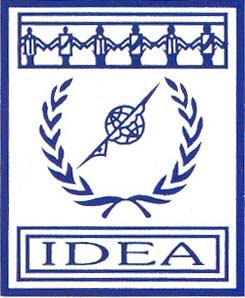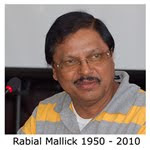After the field visit on May 17 and 18 to some of the slums of the city (attached) and the nature of upgrading being done by the NGOs with the participation of the community, the interaction started from May 19. Prof. Hossainur Rahman, an eminent writer, set the tone of the programme by delving on the need for women’s empowerment, community organizing and also increasing economic self-reliance in society, as advocated by Mahatma Gandhi.
Rabial Mallick, the Sr. Assistant Director of CISRS and Director of IDEA, who conducted the entire training, presented the broad framework of the conditions existing in Third World from the political, economic, social and cultural perspectives. This was followed by detailed analysis of the effect of the political and economic structures on the poorer and backward sections of society.
The presentation on the economic perspective was obviously highlighted because of the so-called development of many countries while the sufferings of the poor have more or less the same. Widening inequality, the disparity between the rural and urban sectors, increasing unemployment and underemployment due to mechanization of the means of production and imbalanced development, homeless and force eviction in Asian countries, which include both India and Bangladesh, have been a matter of great concern. According to Mallick, the challenge today is how to take the movement forward. Apart from financial constraints, the challenge comes from various forces, which include the following:
(i) the politicians who have become been found to promote the interests of the rich sections of society and propagating ideas of development voiced by international financial institutions;
(ii) the bureaucracy whose class character and background alienates them from the common masses and understanding of their problems,
(iii) the judiciary which has been interpreting law from the legal angle without adherence to questions of social justice;
(iv) the industrialist class which have very little concern for taking social responsibility and welfare needs and are only interested to grab poor people's land at below market rates;
(v) the trade unionists who are only concerned about organized class and have very little concern for the vast majority of unorganized workers; and
(vi) the agents of the international institutions who have been advocating anti-poor strategies geared to serve the interests of the imperialists.
Francia Claveullas of Community Organizers Multiversity (COM), a part of LOCOA, Philippines who made presentations from time to time stressed on community power and the need to strengthen this power so as to start social movements against unjust and anti-poor acts of governments. In this connection, she stressed on interaction and community organizing as also networking with communities within and outside one’s country for building up unity and solidarity to fight the corrupt and autocratic political power structures. Francia said that one should not loose hope but have faith, courage and conviction to strengthen and build the community.
Some of the presentations of community organizers of Bangladesh merit attention. Jesmen Akter of Shelter for the Poor made certain significant points which include the following:
(i) unequal distribution of wealth;
(ii) profit-oriented industrialization and increased mechanization not creating enough employment opportunities;
(iii) industrialists grabbing land and exploiting the farmers;
(iv) corruption in the political set-up with no benefits for the common man;
(v) gender inequality whereby women are getting lower wages than their male counterparts;
(vi) law helping the rich and the powerful;
(vii) perverted culture meant just for entertainment with virtually no educational value; and
(viii) superstition and caste discrimination widely prevalent in Bangladesh and India.
Similarly, Gholam Zakaria of Proshika also spoke on the same lines of rising unemployment, increasing landless labour, rural-urban migration for livelihood, pitiable conditions of the poor with no basic amenities, force eviction and faced with exploitation from all sections.
On 23rd May 25 NGOs representatives from Calcutta NGO Forum were invited for an interaction with the community organizers of Bangkadesh. Mr. Shaktiman Ghosh of Hawkers Sangram Committee (HSC) and the International Federation of Hawkers referred to the similarity in anti eviction movements between Manila and Mumbai and also the extent of poverty between the two countries which were more or less equal. In this connection, he emphasized that though our GDP rate was very high the conditions of the poorer sections of the population had not improved and this is reflected in India’s position being 127th in HDI index. Quoting statistics, he said that 93 per cent of the work force was in the unorganized sector in India while 94 per cent was in Bangladesh.
Others who spoke at the interaction were Shampa Roy of Trinita Society for Social & Health Research who talked about his organization’s role in helping child labour in the leather sector in Kolkata and working towards stopping physical torture of women, Md. Taher of FOCUS who wanted a movement to be spearheaded by NGOs for the cause of the poor and the deprived and Dr Subir Banerjee, a social analyst, who envisaged a greater role for NGOs in bringing about the necessary social change. Mrs. Sanchita Das spoke on women empowerment and legal assistant. Some Bangladesh trainees also spoke at this interaction meeting.
The next day (May 24), the trainees were taken to the rural project site of IDEA in Shyampur Block-II in Howrah district, about 60 kms. away from Kolkata. In the morning, field visits were arranged for about 2-3 hours and discussions with local people and CBO leaders about the work of IDEA in the areas of development of SHGs, women’s empowerment, water and sanitation, self employment, housing rights, eviction etc. Rabial Mallick and D. P. Maity, Coordinator of IDEA’s rural project, explained to them the overall work being done by the organization here in the above areas while Mihir Mondal talked about the sanitation project where the IDEA has been successful in achieving almost 100 per cent sanitization in Shyampur-II block.
The Bangladesh trainees and the IDEA community organizers exchanged views about process of development work in these two countries and the role of community organizers to organize the community and develop grassroot leadership. It appeared that the Bangladesh trainees were quite impressed with the quality of work being done by IDEA, specially the SHG (Self Help Group-Micro Credit) work where interest is not taken by the NGO but kept with the members of the SHG for their welfare. Moreover the role of women in SHG work impressed them greatly.
On the final day (May25), the strategies and tactics to build and develop community organizations was outlined by Rabial Mallick and the role of the leadership in this regard, specially to dealt with eviction issue. He stressed that the plan of action at the short term, medium term and long term have to be kept ready keeping in view the socio-economic and political realities. Francia, who also spoke stressed on three vital aspects which include asserting pressure tactics, building people’s power and generating hope and confidence to strengthen the community.
At the concluding session, all the trainees of Bangladesh and also of Kolkata pointed out that the training has been very fruitful and would help them in their future work. The community organizers from Bangladesh, most of who were women, said that they would try to implement what they have seen and learned in their locality to strengthen the community and make their voice heard. The interaction, no doubt helped develop solidarity and fellow feeling between the community organizers of Bangladesh and India.
Another dalit slum the team visited was at Jogmaya (also in Howrah) where scavengers have been living for years together. The lease of the land, which was taken by the Howrah Municipal Corporation (HMC) where the slum is situated, expired sometime in 1996-97 but the land was not returned by the HMC. The families living in the slums are under threat of eviction and as such they have taken the initiative of starting negotiations with the landlord and the HMC for land sharing and in-situ development of this slum. This was greatly appreciated by the Bangladesh team who saw this to be a noble gesture.
In Kolkata, the community visited a 100 year old slum at Kidderpore (under the Kolkata Municipal Corporation) near the Calcutta Port Trust (CPT). The residents were earlier mostly employees of CPT but now other families are also living in this slum. There have been some unauthorized construction in this place and, as there is no threat of eviction, about 200 thousand people continue to live in this slum. To improve the basic necessities, many CBOs specially Busteebasi Samanyya Samity (BSS) have been working for development of this slum.
The Bangladesh team was impressed by the work being done by the CBOs and had interaction with some community organizers.




